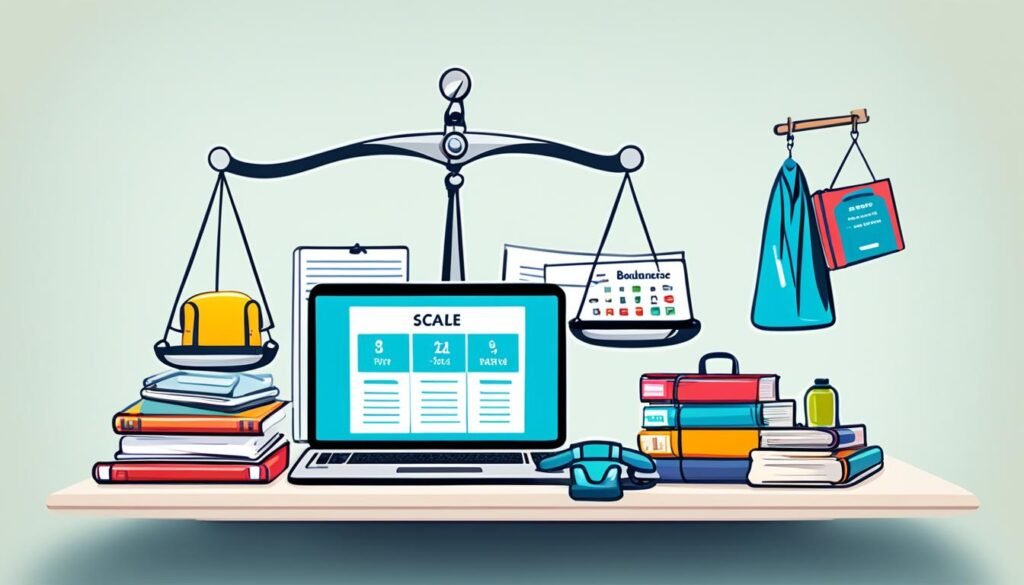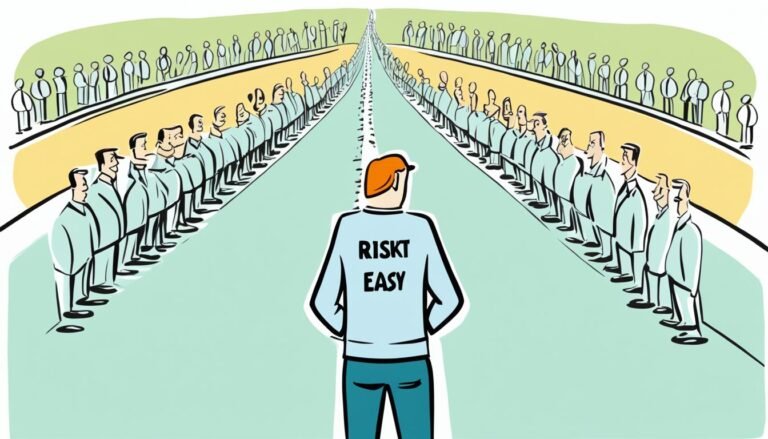Leadership and Time Management: Maximizing Efficiency
Leadership and time management are key for any organization to run smoothly. When leaders use their time well, they can focus on important tasks and make work easier. They can also get more done, be less stressed, and help their team succeed.
This guide shows how leaders can learn to manage their time effectively. It offers tips and tools that lead to success. By using these strategies, leaders can greatly improve their work and help their teams achieve more.
Key Takeaways:
- Maximizing efficiency requires effective leadership skills and efficient time management.
- Leaders who prioritize tasks, streamline processes, and optimize their time usage can achieve their goals and improve productivity.
- Strategies and techniques for maximizing efficiency include the Eisenhower Matrix, successful delegation, effective meeting management, and cultivating work-life balance.
- Utilizing time management tools and apps can boost productivity and improve time management skills.
- Continuous improvement and reflection are essential for optimizing time management and leadership effectiveness.
The Power of Prioritization: Essential Techniques for Leaders
Effective time management is crucial for leaders. With many tasks needing attention, it’s key to focus on the most critical. The Eisenhower Matrix is a powerful tool for this.
The Eisenhower Matrix sorts tasks by their urgency and importance. It helps leaders see clearly which tasks to give time and effort to. It has four sections:
- Urgent and Important: Tasks needing quick action and greatly impact goals.
- Important but Not Urgent: Tasks vital for future success but can wait.
- Urgent but Not Important: Tasks that seem pressing but don’t help meet big goals.
- Neither Urgent nor Important: Low-priority tasks that can be cut or passed to others.
With the Eisenhower Matrix, leaders can spot and work on tasks that matter most. They can cut or delegate tasks that don’t help their goals. Focusing on important tasks lets leaders use their time for what really drives success.
The Pareto Principle, or 80/20 rule, also helps. It shows that 20% of tasks achieve 80% of the results. By finding these key tasks, leaders can focus on work that gives the biggest payback.
Using these methods, leaders can make smarter choices and use their time better. The Eisenhower Matrix and Pareto Principle help them be more productive. They achieve more, even with limited time and resources.
Delegate to Empower: How Leaders Can Share Responsibilities
Leadership becomes more effective when leaders share tasks with their team. This process, called delegation, lets leaders give tasks to team members who have the right skills. Leaders who delegate well empower their team and have more time for important duties.
The Art of Matching Tasks with Skills
It’s key to assign tasks based on team members’ skills. Leaders should look at what each person is good at. Then, they can be sure tasks go to those who can do them best. This way, the team works more efficiently with each person using their strong points.
Clear Communication is Key
Talking clearly is vital when handing out tasks. Leaders should clearly explain what they expect and give all the needed instructions. This helps avoid confusion and keep the work flowing smoothly without mistakes.
Monitoring Progress for Optimal Results
Checking on how things are going is important in delegation. Leaders must keep in touch with their team, guiding and supporting them. This ensures tasks stay on course and that any problems are spotted early. This way, leaders can make things right before it’s too late.
“A good leader recognizes the importance of not wasting time on tasks that others can do.” – Richard Branson
Richard Branson points out that leaders should not do everything themselves. By letting their team handle tasks, leaders can focus on more important things. This also helps the team grow professionally.
Effective Delegation Tips:
- Clearly define tasks and desired outcomes.
- Assign tasks to team members based on their strengths and skills.
- Provide necessary resources and support.
- Communicate expectations and instructions clearly.
- Monitor progress and offer guidance along the way.
- Recognize and appreciate team members’ efforts.
Leaders can greatly improve their team’s performance by mastering delegation. They need to match tasks with the right skills, talk clearly, and keep an eye on how things are going. By following these tips and fully embracing delegation, leaders help both their team and themselves succeed.
Effective Meeting Management: A Time-Saving Strategy for Leaders
Being good at managing meetings is key to saving time and boosting how much work gets done. It’s important for leaders to make sure meetings are on point, useful, and not a waste of anyone’s time. Leaders can make meetings more efficient by using certain strategies. These strategies help do away with doing things that aren’t needed and help get good results.
The Power of a Clear Agenda
Starting with a clear agenda is essential for meeting management. A clear agenda tells everyone what the meeting is about and what should come out of it. It lets people get ready ahead of time, so they can add what they need to. Keep the agenda simple by focusing on the main points and how long you’ll spend on each.
“A clear agenda ensures that meetings stay on track and focus on critical topics. It sets expectations, allows for better preparation, and maximizes everyone’s time.” – John Smith, CEO of ABC Company
Saving Time with Time Limits
Setting time limits for topics keeps things moving and prevents talks from dragging on too long. It makes everyone get to the point quickly. This way, less time is wasted, and the meeting stays dynamic.
“Time limits are essential for effective meeting management. They drive efficiency and prevent discussions from consuming more time than necessary.” – Jane Johnson, Project Manager
Introducing Stand-Up Meetings
Using stand-up meetings can also save a lot of time. People stand and quickly update each other. Since it’s informal, decisions come faster, everyone stays more involved, and there’s less chit-chat.
“Stand-up meetings have revolutionized our team’s productivity. They keep us focused, encourage active participation, and reduce the time we spend in traditional meetings.” – Sarah Brown, Team Lead
Maximizing Productivity through Effective Meeting Management
Good meeting management not only saves time but also improves how much you get done. With a clear plan, time limits, and maybe stand-up meetings, everyone stays focused. This leads to better and quicker decisions and results that matter.
When meetings are run well, people enjoy being part of them and do more for the team’s goals. Managing your time in meetings well helps teams work better, stay motivated, and meet their objectives more easily.
| Benefits of Effective Meeting Management | Strategies for Effective Meeting Management |
|---|---|
| 1. Save time for all participants | 1. Establish a clear agenda |
| 2. Increase productivity and efficiency | 2. Set time limits for each agenda item |
| 3. Foster better decision-making | 3. Implement stand-up meetings |
| 4. Improve team communication and engagement | |
| 5. Drive better outcomes and results |
Cultivate a Healthy Work-Life Balance: The Importance of Personal Time for Leaders
Staying balanced between work and personal life is key for leaders. It helps them stay productive and healthy. Leadership demands can bring stress and burnout, mixing the two worlds. So, it’s important to set clear boundaries, plan personal time, and not skip breaks or vacations. This way, leaders achieve a good balance for their success and happiness.
Setting Boundaries
If leaders don’t set clear lines, work can seep into personal time. Defining these boundaries is essential. It gives them time to relax, recharge, and enjoy their personal life. By doing this and letting their teams know their limits, leaders find a balance. They can handle both work and personal duties well.
Scheduling Personal Time
It’s a must for leaders to insert their personal activities into their packed calendars. This means time for hobbies, seeing family, or any interest they love. Planning personal life helps leaders keep their work in check. They make sure not everything revolves around their job.
Taking Breaks and Vacations
To prevent burnout, leaders must take regular rests. Short breaks during the day help them refresh and refocus. It’s also critical for them to have vacations. This time off lets them recharge fully and enjoy moments with family. These practices highlight the need for self-care and a balanced life for the team too.
Arianna Huffington once said, “We think, mistakenly, that success is the result of the amount of time we put in at work, instead of the quality of time we put in.”

The Wisdom of Arianna Huffington
Arianna Huffington, known for The Huffington Post, is big on the work-life balance message. She talks about the importance of setting boundaries and not neglecting our health. To her, balance brings more creativity and happiness. She also says mistakes are stepping stones to success, offering chances to learn and get better.
| Benefits of Work-Life Balance for Leaders | Actions for Cultivating Work-Life Balance |
|---|---|
|
|
Time Management Tools and Apps to Boost Your Productivity
Technology can make managing time much easier for leaders. There are many tools and apps to help with tasks, better organization, and boost productivity. Let’s look at some top choices:
Trello: Visual Project Management
Trello is a top pick for project management. It lets leaders organize and work together well. You can make boards, lists, and cards. This helps you handle tasks, keep track of progress, and share responsibilities. You can see your projects with just a glance, thanks to its visual layout.
Todoist: Efficient Task Management
Todoist is great for making and sorting to-do lists for leaders. It includes due dates, reminders, and task priorities. This ensures you always know what to do next. You can use it on different devices, which makes it handy for busy leaders.
RescueTime: Time Tracking and Productivity Analysis
RescueTime tracks your time to show how you use it. It watches what you do on apps and websites. This info helps you see where time is wasted. Then, you can learn to make better choices for your productivity.
Focus@Will: Enhance Concentration with Music
Focus@Will uses music to help you focus better. It has a range of music channels designed by science. This helps to block out noise and increase your ability to concentrate. Better focus means higher productivity.
Trying out different time management tools is key. You should find what works best for you. Each tool has its own perks, so make sure it fits your needs well. Technology’s help can really boost the efficiency of leaders.
A Time for Reflection: Regularly Assess and Optimize Your Time Management
Improving how you use time is key for leaders. It’s vital to often check and change how you use time. This way, leaders can be more productive by picking the right tasks and balancing work and life well.
Looking back and learning from past experiences can be very helpful. It gives you clues on what to do better with your time. Then, you can tweak your ways to make them work even better.
Start by seeing which tasks are really important. This helps you focus on what matters most. You can get more done by putting your time into what moves you forward the most.
Don’t forget the importance of breaks and personal time. Mixing work with some me-time helps you stay fresh. This keeps you from getting too tired or feeling overwhelmed.
Improving your time use is an ongoing task. Keep checking and refining how you manage your time. This will make you a better leader overall.
Key Points:
- Regularly assess and adjust your time management strategies to optimize your approach.
- Evaluate tasks to identify time-consuming activities that can be delegated or optimized.
- Maintain a healthy work-life balance by scheduling personal time and taking breaks and vacations.
- Reflect on previous experiences and lessons learned to improve your time management skills.
The Leadership Mindset Dilemma: Overcoming Time Management Challenges
The leadership mindset challenge is tough with time management. Leaders often think doing tasks alone is better and faster. They sometimes believe they’re too busy to delegate or train others. But this thinking holds back team growth. To manage time well, it’s vital to prioritize and delegate where needed. Leaders should work on preparing the leaders who will come after them.
“The best leaders are those who empower and develop their team members.” – John Maxwell
Delegation is key for leaders. It helps them use their time better and lets their team shine. By giving the right tasks to the right people, leaders can focus on what really matters. Plus, it gives their team chances to grow. Good delegation means clearly explaining tasks, making sure they understand, and keeping track of progress. Richard Branson advises not to waste time on tasks others can do.
Investing in future leaders is both smart and important for a lasting leadership culture. Leaders should spend time helping their team grow into future leaders. This helps leave a legacy of success. Growing and mentoring new leaders is also how organizations keep doing well over time.
Key Strategies to Overcome Time Management Challenges:
- Recognize the importance of effective delegation: Delegate tasks that can be handled by others, allowing you to focus on higher-level responsibilities.
- Embrace a growth mindset: Invest in developing and mentoring the next generation of leaders to ensure continuity and success.
- Prioritize effectively: Identify and prioritize tasks based on their importance and urgency, focusing on high-impact activities.
- Set realistic expectations: Avoid overloading yourself with tasks and learn to say no when necessary.
- Utilize time management tools and techniques: Explore time management apps and strategies that can help you optimize your productivity.
By overcoming the leadership mindset challenge, leaders can better manage their time. This approach fosters long-term success by focusing on team growth and development.
| Avoid | Achieve |
|---|---|
| Busy mindset that hinders delegation | Effective delegation that empowers the team |
| Focus only on immediate tasks | Invest in building the next generation of leaders |
| Overwhelm and burnout | Efficient time management and work-life balance |
Conclusion
Having great time management helps leaders be successful. They know how to put tasks in order, focus on their goals, and give some work to others. This way, they also keep a good balance between work and life.
Leaders work better by taking charge of how they use time. They look at what they do and change it, finding ways to do things faster or let someone else do them. It’s key to live a balanced life, too. They make time for themselves, take breaks, and plan trips to relax and do well at work.
Working with a coach can help leaders manage their time even better. It’s all about getting better and stress-free work. With the right time skills, leaders feel sure of themselves and enjoy life both at work and at home.








